Rio de Janeiro’s Little Africa is a vibrant neighborhood that unveils the profound impact of African culture on Brazil’s identity. Colorful murals, lively street performances, and renowned eateries bring this Afro-Brazilian legacy to life. Yet, beyond the captivating sights and sounds, lies a deeper exploration of the community’s resilience and its connections to the broader African diaspora. Delving into Little Africa opens a window into understanding Brazil’s complex history and the ongoing influence of Afro-descendant traditions.
- Key Points
- Unraveling the Afro-Brazilian Legacy in Rio
- Exploring the Neighborhoods of Little Africa
- Taking in the Vibrant Afro-Brazilian Culture
- Uncovering the Connections to the African Diaspora
- Discovering the Roots of Samba and Capoeira
- Savoring the Flavors of Afro-Brazilian Cuisine
- Tracing the Resilience and Resistance of Afro-Brazilians
- The Sum Up
- More Hiking & Trekking Tours in Rio de Janeiro
- More Tours in Rio de Janeiro
- More Tour Reviews in Rio de Janeiro
- Still browsing? Here are more Rio de Janeiro experiences we've covered recently
Key Points

- Little Africa neighborhoods in Rio offer a unique window into Afro-Brazilian heritage, showcasing vibrant murals, historical sites, and traditional cuisine.
- Immersive cultural experiences in Little Africa include samba, capoeira, lively street markets, and festive gatherings celebrating Afro-Brazilian traditions.
- The African diaspora has profoundly shaped Brazilian identity, with Afro-Brazilian cultural traditions, religious practices, music, and cuisine deeply influencing the country.
- Afro-Brazilian resilience and resistance are central to the community’s identity, as seen in the preservation of Candomblé, thriving samba schools, and quilombo communities.
- Vibrant murals and street art in Little Africa celebrate Afro-Brazilian identities and serve as a powerful expression against systemic racism.
Unraveling the Afro-Brazilian Legacy in Rio
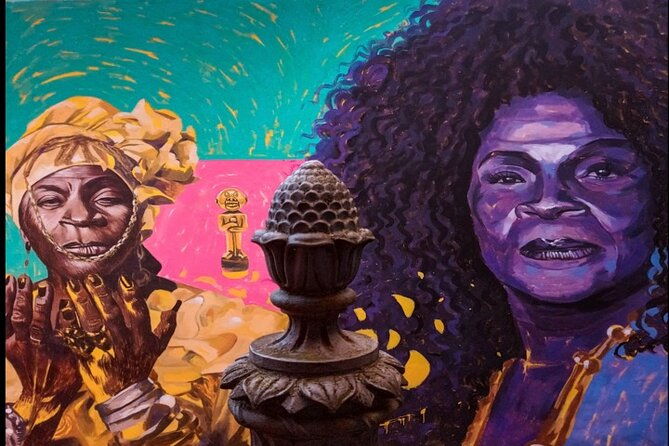
Rio de Janeiro is a city steeped in Afro-Brazilian history and culture. Africans were forcibly brought to Brazil as slaves, leaving an indelible mark on the country’s identity.
In Rio, the vibrant Afro-Brazilian heritage is evident in the music, dance, cuisine, and religious traditions that have endured. Neighborhoods like Pedra do Sal and Saúde, known as "Little Africa," preserve this rich legacy.
Exploring these areas offers insights into the struggles and resilience of the Afro-Brazilian community. Their influence has shaped the very fabric of Rio, from its rhythmic samba to its syncretic spiritual practices.
Fascinated by the past? Here are other historical experiences we've covered in Rio de Janeiro
Exploring the Neighborhoods of Little Africa
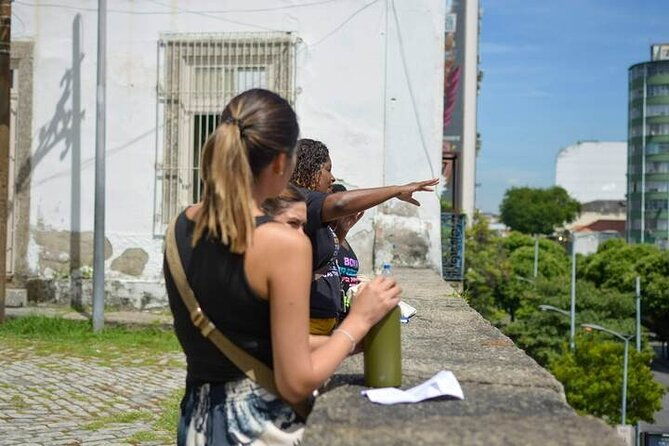
Where can one enjoy the vibrant Afro-Brazilian heritage of Rio de Janeiro? The neighborhoods of Little Africa offer a unique glimpse into the city’s deep-rooted African influences.
From the colorful murals adorning the streets to the rhythmic beats of samba, this vibrant area showcases the enduring cultural legacy of Afro-Brazilians.
Visitors can explore historical sites, such as the Praca Quinze de Novembro, or indulge in traditional cuisine at local eateries.
Taking in the Vibrant Afro-Brazilian Culture
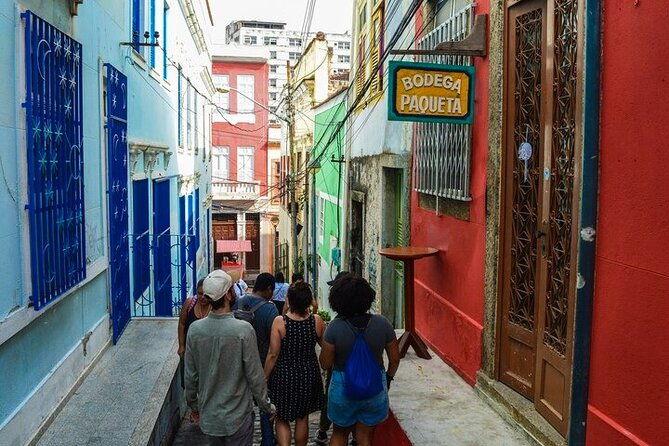
Visitors to Rio’s Little Africa neighborhoods can enjoy the vibrant Afro-Brazilian culture that permeates the area.
Vibrant rhythms of samba and capoeira fill the streets, drawing in onlookers. Locals proudly display their Afro-Brazilian heritage through:
-
Colorful street murals depicting Afro-Brazilian icons and symbols.
-
Traditional Afro-Brazilian cuisine, including feijoada and acarajé.
-
Lively street markets selling handcrafted goods, African textiles, and religious artifacts.
-
Festive gatherings celebrating Candomblé, an Afro-Brazilian religion with roots in West Africa.
This immersive experience offers a profound appreciation for the enduring legacy of Afro-Brazilian culture in Rio.
Uncovering the Connections to the African Diaspora
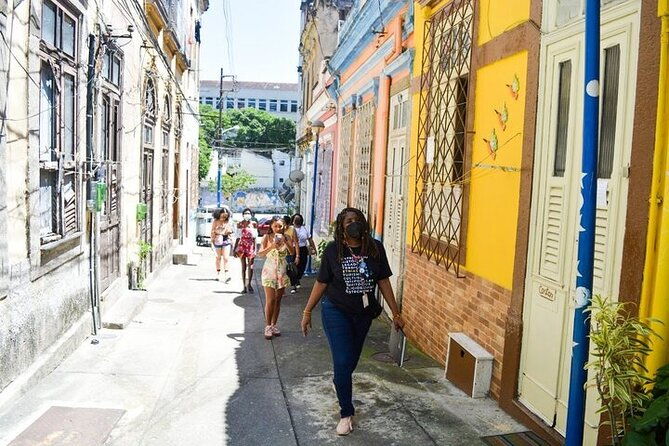
Although Little Africa in Rio de Janeiro is a vibrant hub of Afro-Brazilian culture, its connections to the broader African diaspora extend far beyond the city’s borders.
The roots of this heritage trace back to the transatlantic slave trade, which brought over 4 million Africans to Brazil. Their cultural traditions, religious practices, and legacies have profoundly shaped Brazilian identity, from music and cuisine to language and social structures.
Exploring this rich tapestry of shared experiences allows visitors to understand the profound impact of the African diaspora on Brazil and its enduring influence in Rio de Janeiro.
Discovering the Roots of Samba and Capoeira
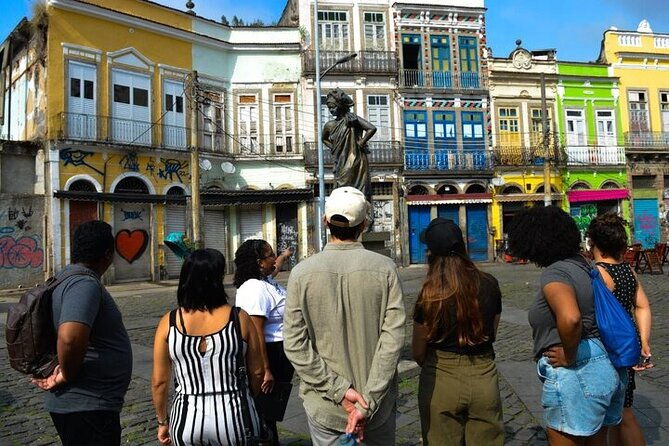
As travelers explore the vibrant streets of Little Africa in Rio, they can’t help but be captivated by the rhythmic sounds of samba and the graceful movements of capoeira.
These cultural expressions have deep roots in the African diaspora, reflecting the resilience and ingenuity of enslaved Africans.
The cultural expressions of Little Africa in Rio reflect the resilience and ingenuity of enslaved Africans in the diaspora.
Visitors can witness:
-
Samba schools practicing their elaborate dance routines and costumes in preparation for Carnival.
-
Capoeira practitioners engaging in their fluid, acrobatic martial art, a blend of dance and combat.
-
Street musicians playing traditional instruments like the berimbau.
-
Local residents celebrating their Afro-Brazilian heritage through music, dance, and community gatherings.
- Petropolis the Imperial City With Beer Tour and Lunch
- Petropolis the Imperial City With Beer Tour and Lunch
- Full Day: Christ Redeemer, Sugarloaf, City Tour & Barbecue Lunch
- Rios City Tour – Tickets for Christ, Sugar Loaf & Lunch Included
- Rios Full Day: Selarón Steps, Christ & Sugarloaf – Tickets & Lunch Included
- Hang Gliding Hang Gliding Experience Rotorfly
Savoring the Flavors of Afro-Brazilian Cuisine

Beyond the rhythmic beats of samba and the graceful movements of capoeira, the vibrant culinary landscape of Rio’s Little Africa offers a tantalizing window into the rich Afro-Brazilian heritage.
From the aromatic stews of acaçá and vatapá to the comforting plates of acarajé and moqueca, the flavors of this community reflect centuries of cultural exchange and resilience.
Visitors can indulge in the robust spices, succulent meats, and vibrant produce that define this unique cuisine, gaining a deeper appreciation for the African roots that have profoundly shaped Brazil’s gastronomic identity.
Tracing the Resilience and Resistance of Afro-Brazilians
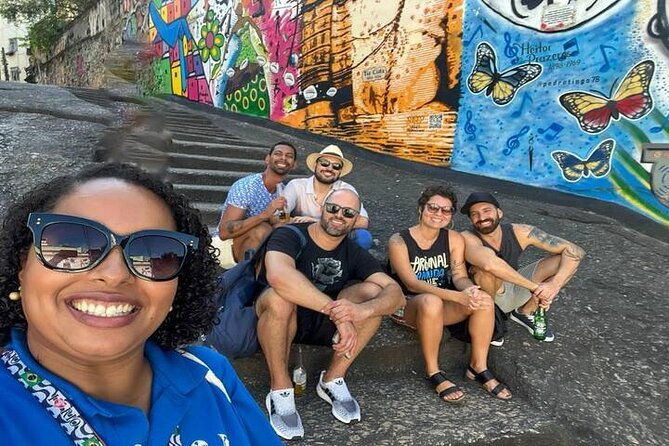
Beneath the vibrant cultural tapestry of Rio’s Little Africa lies a profound narrative of Afro-Brazilian resilience and resistance. Descended from enslaved Africans, Afro-Brazilians have endured centuries of oppression, yet their spirit remains unbroken.
This resilience manifests in:
-
The preservation of Afro-Brazilian religious practices, like Candomblé, which blend indigenous, Catholic, and African traditions.
-
The thriving samba schools, where Afro-Brazilians showcase their rich cultural heritage through music, dance, and pageantry.
-
The Quilombo communities, rural settlements founded by escaped enslaved people, which stand as symbols of Afro-Brazilian self-determination.
-
The vibrant murals and street art that celebrate Afro-Brazilian identities and resistance against systemic racism.
The Sum Up
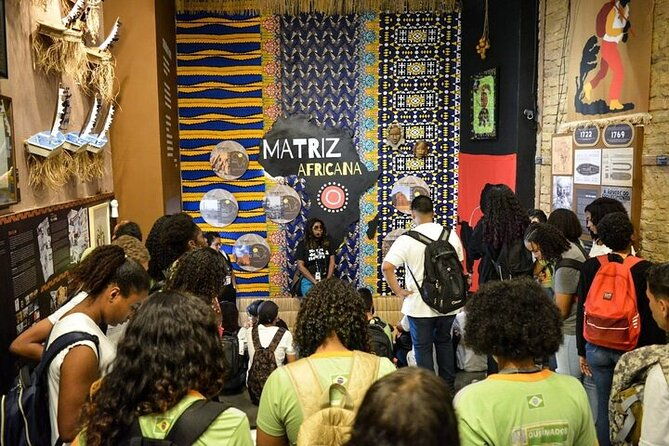
Little Africa in Rio de Janeiro is a vibrant showcase of Afro-Brazilian heritage, where a rich cultural legacy lives on. Colorful murals, lively street performances, and traditional eateries celebrate the profound influence of African culture on the city’s identity. This vital hub offers a profound understanding of Brazil’s Afro-descendant roots and the broader African diaspora, highlighting the resilience and resistance of Afro-Brazilians.
More Hiking & Trekking Tours in Rio de Janeiro
- Private Hiking Tour to Telegrafo Stone + Grumari Beach – by OIR Aventura
- Tijuca Forest Hiking Tour – Rio De Janeiro by Rio Eco Trip
- Trekking Pedra Do Sino – Full Day – Serra Dos Órgãos National Park
- Tijuca Peak Hiking Tour & Taunay Waterfall – Rio De Janeiro
- Pedra Bonita Hiking Tour – (Beautiful Rock)
- Full Day Trek to Pedra Do Sino – Serra Dos Órgãos National Park
More Tours in Rio de Janeiro
- Boat Tours in Búzios
- Telegraph Stone – Trail With Tour Guide and Transportation From the Hotel
- Private Hiking Tour to Telegrafo Stone + Grumari Beach – by OIR Aventura
- Grumari, Prainha & Pontal Beach Day Tour in Rio De Janeiro With Transfer
- 3-Day Customizable Tour of Rio De Janeiro
- Half-day Swim & Fun Boat Tour in Rio
More Tour Reviews in Rio de Janeiro
- Rio De Janeiro: Wake up and Sail
- Boat Tours in Búzios
- From Rio De Janeiro: Arraial Do Cabo Island Day Trip
- Telegraph Stone – Trail With Tour Guide and Transportation From the Hotel
- Private Hiking Tour to Telegrafo Stone + Grumari Beach – by OIR Aventura
- Grumari, Prainha & Pontal Beach Day Tour in Rio De Janeiro With Transfer
Still browsing? Here are more Rio de Janeiro experiences we've covered recently
- Rio De Janeiro: Wake up and Sail
- Boat Tours in Búzios
- From Rio De Janeiro: Arraial Do Cabo Island Day Trip
- Telegraph Stone – Trail With Tour Guide and Transportation From the Hotel
- Private Hiking Tour to Telegrafo Stone + Grumari Beach – by OIR Aventura
- Grumari, Prainha & Pontal Beach Day Tour in Rio De Janeiro With Transfer
- 3-Day Customizable Tour of Rio De Janeiro
- Half-day Swim & Fun Boat Tour in Rio
- Visit to Madureira Park in Rio De Janeiro With Transfer
- In Favela All Day Long
- Transfer In Van RJ Airport Copacabana Barra Ipanema Leblon Centro
- Samba Class
